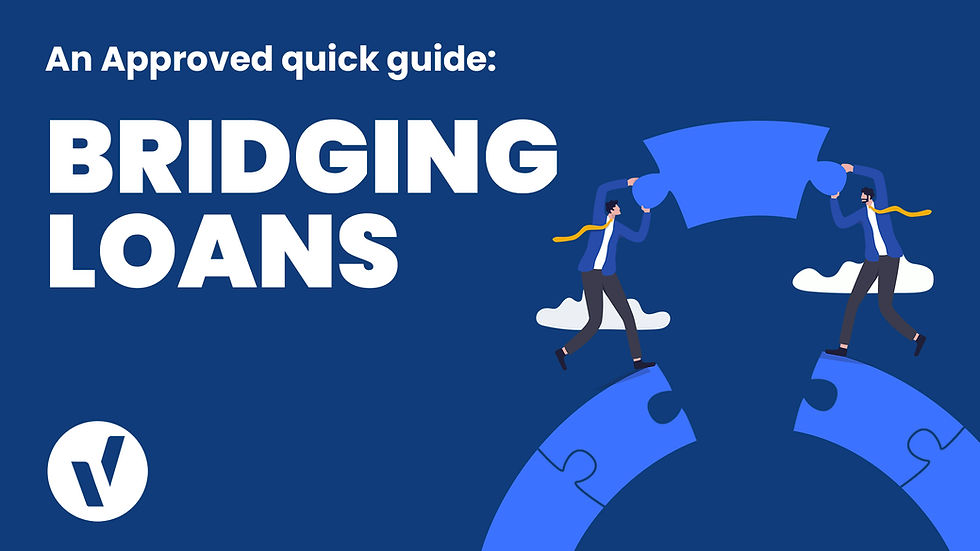Bridging Loans: Everything you need to know...
- Laurie Baugh

- Jul 5, 2023
- 4 min read

Bridging finance is a dynamic tool for commercial real estate investors and developers, offering a swift and flexible financial solution to seize opportunities in a competitive market. This guide expands on the key points of bridging finance to provide a deeper understanding of its features, benefits, risks, and applications.
What is Bridging Finance?
Bridging finance is a short-term funding option designed to "bridge" the gap between a financial need and securing long-term financing or selling an asset.
Use Cases: It’s particularly useful in commercial real estate to purchase properties quickly, finance renovations, or handle time-sensitive opportunities.
Secured Loans: Typically secured against real estate, bridging loans allow borrowers to leverage their assets for immediate liquidity.
Flexibility: Unlike traditional loans, bridging finance offers customised terms to suit the project timeline and financial goals.
How Much Deposit is Needed for a Bridging Loan?
The deposit requirement for a bridging loan often falls between 20% and 30% of the property value. However, this can vary depending on factors like:
Loan-to-Value Ratio (LTV): Many lenders offer up to 70%-75% LTV, meaning the borrower provides the remaining percentage as a deposit.
Additional Security: Lenders may accept other properties or assets as security to reduce the upfront deposit amount.
Creditworthiness: Borrowers with strong financial profiles may negotiate better terms.
How Long Does it Take to Get a Bridging Loan?
The process of securing a bridging loan is significantly faster than traditional financing, often completed within 5-14 days, depending on:
Lender’s Efficiency: Some lenders specialise in fast processing.
Borrower Preparedness: Providing clear documentation, such as property valuations and proof of income, expedites the process.
Complexity: Loans involving multiple securities or higher risks may take additional time for underwriting.
Can You Get 100% Bridging Loans?
While 100% bridging loans are rare, they are possible under specific conditions:
Additional Security: Borrowers may need to offer other properties or assets as collateral to cover the loan amount fully.
Strong Guarantees: A guarantor with a solid financial background can enhance the chances of obtaining full financing.
High-Value Projects: Some lenders might approve 100% financing for lucrative, low-risk projects with excellent profit margins.
What Can You Use a Bridging Loan For?
Bridging loans are versatile and can be used for numerous purposes, such as:
Purchasing Property Quickly: Ideal for auctions or time-sensitive purchases.
Renovation and Refurbishment: Financing upgrades or repairs to enhance property value.
Development Projects: Funding new builds or large-scale renovations.
Property Chains: Resolving issues in property sales chains to avoid delays.
Business Expansion: Purchasing commercial premises or expanding operations.
Should You Get a Bridging Loan?
Bridging loans are effective for those who need fast access to capital, but they may not be suitable for everyone. Here’s what to consider:
Pros:
Rapid funding for time-sensitive opportunities.
Flexible terms tailored to individual needs.
Enables investors to capitalise on high-value projects.
Cons:
Higher interest rates compared to traditional loans.
Short repayment terms, typically 6-12 months, requiring a clear exit strategy.
Risk of repossession if repayment terms are not met.
Is It Right for You?
Evaluate your financial situation, exit strategy, and risk tolerance before committing to a bridging loan.
Why Use Approved Property Finance?
Approved Property Finance stands out for its tailored approach and customer-focused service. Here’s why:
Expertise: Their specialist team provides bespoke solutions to meet individual project needs.
Speed: Streamlined processes ensure quick access to capital.
Flexibility: Competitive rates and customisable terms help clients achieve their goals.
Trust: A strong reputation for transparency and reliability makes them a preferred choice for commercial bridging finance.
How Does Bridging Finance Work?
The bridging loan process involves a few straightforward steps:
Initial Application: Submit a no-obligation application to outline your needs. This won’t affect your credit score.
Property Valuation: The lender assesses the property or properties offered as security.
Approval: Based on the valuation and documentation, the lender provides an offer.
Funding: Once terms are agreed, funds are released quickly to your account.
Repayment: You repay the loan via an exit strategy, such as securing long-term financing or selling the asset.
Advantages of Bridging Finance
Bridging finance provides unparalleled advantages for commercial real estate ventures:
Speed: Access funds in days rather than months.
Opportunity Seizure: Ideal for auctions or distressed sales.
Customisation: Tailored terms to align with project timelines.
Short-Term Commitment: Avoid long-term liabilities by repaying quickly.
Risks of Bridging Finance
Despite its benefits, bridging finance carries risks:
High Costs: Interest rates can be significantly higher than traditional loans.
Repayment Pressure: A short repayment window necessitates a solid exit strategy.
Market Fluctuations: Property value changes could impact the ability to repay or refinance.
Conclusion
Bridging finance is a powerful tool for commercial property investors and developers who need fast and flexible funding. By understanding its nuances, potential uses, and risks, borrowers can make informed decisions that drive success in their real estate ventures.
For tailored advice and support, consult the expert team at Approved Property Finance and unlock the potential of bridging loans to achieve your property investment goals.
Looking for Property Finance Solutions?
Whether you're in need of Commercial Mortgages, Development Finance, Bridging Loans, or Buy-to-Let options, our Property Finance team is here to help. With years of experience and a deep understanding of the property market, our specialists can find the right financial products for your needs.
Contact our team today at 01908 429888 or email us at info@approved-finance.co.uk to learn more. Alternatively, you can explore our comprehensive guide to bridging loans by clicking here.

















